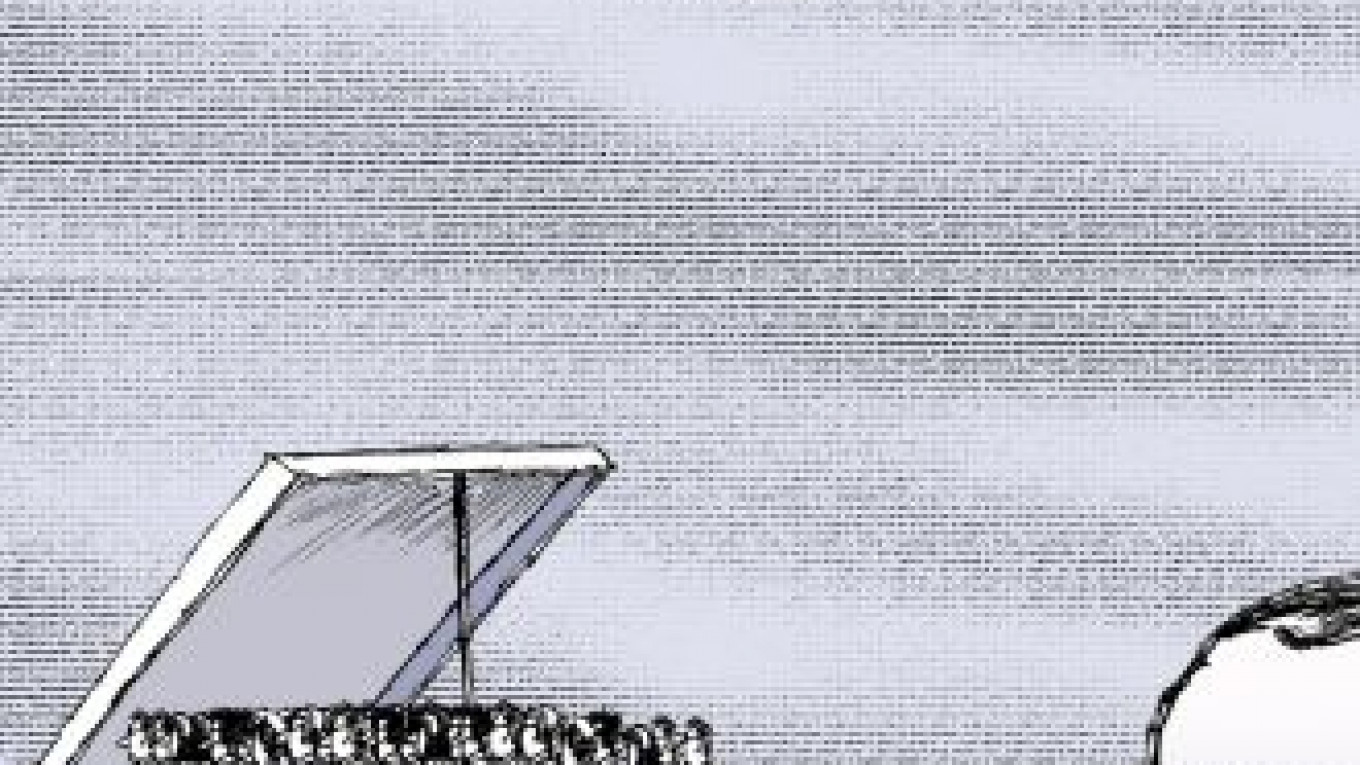After Yukos CEO Mikhail Khodorkovsky was sentenced to an additional six years in prison, opposition leader Vladimir Ryzhkov said on Ekho Moskvy radio that he feared that the ruling might spark a new wave of emigration.
Ryzhkov has reason to be concerned — and so do the country’s leaders.
The Khodorkovsky ruling in itself may not cause a new emigration wave, but it could be the last straw for thousands of talented citizens who have given up hope after 10 years of Vladimir Putin’s leadership.
Despite President Dmitry Medvedev’s promises to lower bureaucratic barriers and corruption, Prime Minister Putin’s vertical power structure necessarily prevents the development of a bottom-up entrepreneurial society with a large middle class. As a result, the gap has widened between the rich and the poor. People across all social segments — with the exception of the bureaucratic class — fear that they have little, if any, future in the country.
For young people without connections and education, hopelessness regarding their future has manifested itself in a sharp increase in ultranationalism. We saw clear evidence of this during the Manezh Square rioting last month.
On the other side of the social spectrum, many innovative Russians have also given up on the country. Over the past decade, nearly 1 million people have left the country, about 80 percent of whom were highly qualified specialists and talented students, Ryzhkov said, citing statistics from the Federal Migration Service. Just as Putin during his annual call-in show delivered his guilty verdict on Khodorkovsky, these Russians delivered their own guilty verdict on Putin’s Russia by voting with their feet.
When the political and economic situation gets bad enough, first the money flees — a record $230 billion over the past three years, according to the Central Bank — and then the people follow.
This trend of losing 80,000 talented and entrepreneurial citizens to emigration every year can be expected to continue as long as the government is unable to control corruption or provide basic rule of law, above all property protection. According to an August poll conducted by Superjobs.ru, 73 percent of the 1,000 “economically active” Russians surveyed said they would leave Russia given the opportunity. It is these enterprising people who the country needs the most to modernize.
Particularly revealing is a Levada Center poll taken among college-educated Russians that found 48 percent sometimes think about leaving the country. The poll, conducted in May 2008, months before the financial crisis hit, shows that disenchantment with Putin’s Russia is systemic and runs much deeper than cyclical economic crises.
During the Soviet era, the country’s leadership never had a problem with brain drain for the simple reason that emigration was all but impossible. Despite Putin’s nostalgia for the Soviet era, it would be nearly impossible for him to restrict emigration, particularly since Article 27 of the 1993 Constitution allowing for free emigration is one of the most-coveted freedoms that Russians gained after the Soviet collapse. Thus, if the legal, political and economic environment doesn’t improve significantly during the next 10 years, another 1 million Russians may very well want to exercise this constitutional right.
So who would remain in Russia during the next decade under Putinism? From one side of the spectrum, there will be a significant percentage who are stuck in dead-end, low-skilled jobs that pay less than $500 a month, particularly in the regions, and who don’t have the means or skills to emigrate. On the other end, there will be a large class of bureaucratic elite — despite Medvedev’s and Putin’s repeated attempts to decrease its numbers — who produce little and largely feed off the energy-based rentier economy.
Between the ruling elite and the poor, Russia’s already minuscule middle class will diminish even further as long as economic opportunities remain small, corruption remains high and business initiative continues to be suffocated by growing lawlessness that the Khodorkovsky ruling and government expropriation of Yukos so vividly exemplified.
Just as the second Khodorkovsky verdict could spark a new wave of emigration, his early release could at least limit it. Medvedev can play a direct role in this by stamping out corruption and guaranteeing the rule of law. Freeing Khodorkovsky might be a good place to start.
A Message from The Moscow Times:
Dear readers,
We are facing unprecedented challenges. Russia's Prosecutor General's Office has designated The Moscow Times as an "undesirable" organization, criminalizing our work and putting our staff at risk of prosecution. This follows our earlier unjust labeling as a "foreign agent."
These actions are direct attempts to silence independent journalism in Russia. The authorities claim our work "discredits the decisions of the Russian leadership." We see things differently: we strive to provide accurate, unbiased reporting on Russia.
We, the journalists of The Moscow Times, refuse to be silenced. But to continue our work, we need your help.
Your support, no matter how small, makes a world of difference. If you can, please support us monthly starting from just $2. It's quick to set up, and every contribution makes a significant impact.
By supporting The Moscow Times, you're defending open, independent journalism in the face of repression. Thank you for standing with us.
Remind me later.






